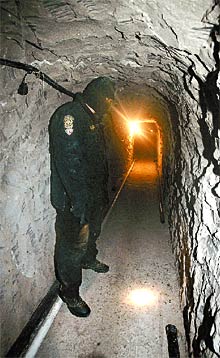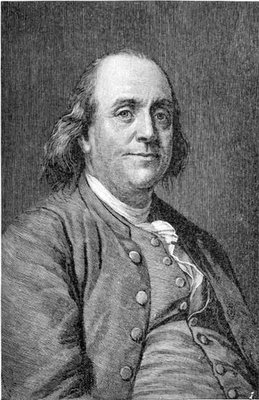The plight of a church in a historic but crumbling portion of Sand Springs, a city just west of Tulsa, is getting some national attention today. National Review attention.For seven years, Reverend Roosevelt Gildon has preached the gospel at the Centennial Baptist Church in Sand Springs, Oklahoma. His congregation, around 50 strong, is like a small family. The elderly members, and those without cars, often walk to Sunday services.
“Rosey,” as his friends call him, figured he’d go on preaching in the tidy steel structure for years to come. That was, until the government told him they were taking his church away. Since the Supreme Court's controversial Kelo decision last summer, eminent domain has entered a new frontier. It’s not just grandma’s house we have to worry about. Now it’s God’s house, too. “I guess saving souls isn’t as important,” says Reverend Gildon, his voice wry, “as raking in money for politicians to spend.” The town of Sand Springs, Oklahoma, has plans to take Centennial Baptist — along with two other churches, several businesses, dozens of small homes, and a school — and replace them with a new “super center,” rumored to include a Home Depot. It’s the kind of stuff that makes tax collectors salivate. It’s also the kind of project that brakes for no one, especially post-Kelo. “I had no idea this could happen in America,” says Reverend Gildon, after spending Monday morning marching in the Sand Springs Martin Luther King Day parade.
The area is just east of Highway 97 and just south of the Keystone Expressway, an area of homes, businesses, churches and a school. Many of the structures date back to the time of the Tulsa race riots (1921), built in the aftermath on a grant of land from oil baron/philanthropist Charles Page, who was touched by the plight of the blacks who were burned out in north Tulsa.
But today Sand Springs officials, along with others in the city of Tulsa and Tulsa County, are less interested in preserving history, homes and community than they are in commercial developments that will bring jobs and tax revenue. Thus the 2003 Vision 2025 Project which, passed by voters, is providing the funding for the development, among other projects.While the Kelo decision occurred after the Vision 2025 vote, it does grease the wheels, so to speak, of efforts to condemn property, and there is a lot less incentive to negotiate a land sale in good faith. The writer, Heather Wilhelm, makes note of this:The money earmarked for Sand Springs was supposedly meant to focus on redeveloping an abandoned industrial area for big box retailers and other stores. One problem: Centennial Baptist Church isn’t abandoned, and unlike some of the other buildings in its neighborhood, it is in pristine condition. More importantly, the church doesn’t want to sell — and they have good reasons. “After I heard the news, we started looking to see if we could move,” Gildon said. “I just don’t think we can afford it. It’s too expensive. And if we can’t move, and they take our building, what happens to the church? If we leave, who is going to minister to the black community in Sand Springs?” Reverend Gildon is a practical man. He’s not a firebrand, and he’s not looking for a fight. He just loves God and loves his church, and wants to continue serving his community. Unfortunately, local officials would rather have an extra parking lot for a new Bed Bath & Beyond.
It makes sense on one level. Churches don’t generate any tax revenue for the government to spend. They don’t “stimulate” the economy. They often, much to their peril, occupy prime, envied real estate. With the supercharged powers granted by Kelo, be very, very afraid.
What’s most egregious about this application of eminent domain is that there’s already plenty of room for development, even if the pesky church sticks around. Many community residents were happy to sell their property. Two other churches in the area decided to move to Tulsa. Other structures in the area were dilapidated and ready for the deal. The way things are now, Centennial Baptist Church could easily live side-by-side with new stores, houses, or businesses. Yet Centennial remains in the crosshairs — even though two nearby national chains, a taxpaying McDonald’s and a taxpaying O’Reilly’s muffler shop, have been left alone.
The Rev. Gildon has joined up with Americans for Limited Government and its Oklahoma partner, Oklahomans in Action, to promote a ballot initiative for November that, if passed, would limit Kelo-style eminent domain abuses.
NOTE -- We just happened to be in Sand Springs this morning and took a couple of spins around the affected neighborhood, kicking ourselves that we did not bring the camera along. It's apparent that Centennial Baptist is in better shape than most of the other buildings including, we suspect, the McDonald's that will stay. What really hit home was the fact that an omnibus measure like Vision 2025 is really too crude an instrument to be providing the funding for projects in local communities. For instance, what does the Oklahomilist, who lives in Broken Arrow, know of the true needs of Sand Springs, or Owasso, or Jenks, or even Bixby, which is right next door? In truth all we can do when such a measure is on the ballot is look to see how it affects us, locally. Thus our "yes" vote is blissfully ignorant of how others might be affected.
This is not the stuff of which good neighbors are made.
All the more reason to join in the killing of Kelo.
ADDENDUM NOTE -- Michael at BatesLine has more, including links to previous posts. Plus he posted on the National Review article last night.








